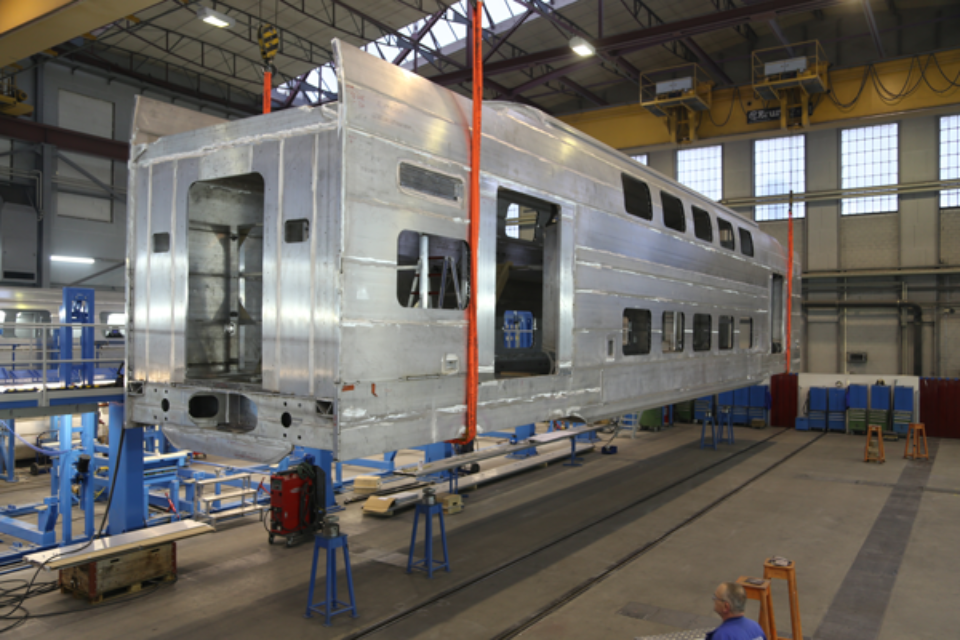First Carbody of Double-Deck Aeroexpress Train Produced by Stadler
Feb 5, 2014
05.02.2014 – Altenrhein, Switzerland. Stadler Rail Group has successfully manufactured the first aluminium carbody of the fleet of 25 double-deck trains ordered by airport express operator Aeroexpress. The aluminium carriage has been examined and accepted by the technical experts of Aeroexpress on 3–5 February in Altenrhein, Switzerland. With the acceptance of the first carbody, the project reached its first significant milestone in accordance with the timing of the preliminary agreed production schedule. The first train will be delivered to Russia for authority certification and engineering testing already in October this year, while the start of commercial operation is expected in June 2015.

The first produced carbody is a motor coach, which will be followed by the production of further intermediate and end carriages of the first train. After the painting of the welded carbodies, the final assembly of the train is going to take place. According to the production plan, the first three trains are to be produced completely in Altenrhein, which is the competence centre of Stadler in Switzerland for the production of double-deck trains. Stadler has also built up recently a new factory in Minsk, Belarus, which is going to join the production of Aeroexpress trains from the fourth vehicle by performing carbody welding, painting, assembling and commissioning. According to the current schedule, the first unit is expected to arrive to Russia around October this year, after which it undergoes authority examinations, and other tests for winter operation. Commercial operation of the first train is set to commence in June 2015, while the last – 25th train of the delivery – is expected to enter service in June 2016.
The Stadler Rail Group has become a strategic partner for Aeroexpress after participating and winning an international tender in Moscow in 2013. The parties signed the contract in May last year. The contract includes the supply of 25 double deck KISS type trains, out of which 16 units will be four-car and 9 will be six-car vehicles. The contract is worth EUR 385,31 million (excluding VAT), by the frames of which altogether 118 railcars will be produced by Stadler. The new double-deck fleet will allow a 30-40% increase in the transport capacity of Aeroexpress trains. The new trains will be transporting passengers between Belorussky, Kievsky, and Paveletsky rail terminals and Sheremetyevo, Vnukovo and Domodedovo international airports. The carbodies are made of aluminium, making it possible to significantly decrease their weight compared to traditional railcars made of steel, while also reducing operating expenses. The new trains will have a top speed of 160 km/h.
About Stadler
Stadler Rail Group, system supplier of customer-specific solutions for rail vehicle construction, has locations in Switzerland (Altenrhein, Bussnang, Winterthur and Biel), in Germany (Berlin-Pankow, Berlin-Hohenschönhausen, Berlin-Reinickendorf and Velten), in Poland, Hungary, the Czech Republic, Italy, Austria, Belarus, Algeria and in the USA. The Group has a workforce of around 6,000 people, of which 3,000 are based in Switzerland. The best-known vehicle series from Stadler Rail Group are the articulated multiple-unit train GTW (575 trains sold), the Regio-Shuttle RS1 (497 trains sold), the FLIRT (944 trains sold) and the double-decker multiple-unit train KISS (171 trains sold) in the railway segment, and the Variobahn (320 vehicles sold) and the Tango (147 vehicles sold) in the tram segment. The Metro is another addition for the commuter rail market (2 + 34 vehicles sold). Furthermore, Stadler Rail manufactures metre-gauge trains, passenger carriages and locomotives and is the world’s leading manufacturer of rack-and-pinion rail vehicles.